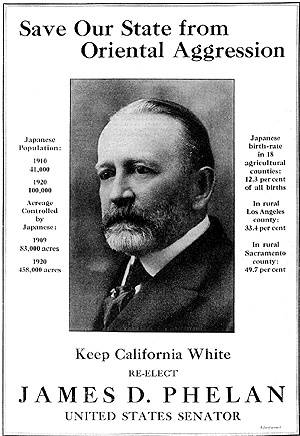
As a white liberal, Saint Patrick’s Day makes me very uncomfortable. If you ask me, a lot of white “liberals” who use the holiday as a political organizing opportunity or celebration aren’t particularly “liberal.” When I see Irish-American boosterism, in particular the “Stage Irish” boosterism associated with both Saint Patrick’s Day and moderate politics in San Francisco, I tend to see racism and self-serving incompetence.
Mind you, I’m not necessarily talking about going to Harrington’s for some green beer. It ain’t my thing, but that’s not what I see as socially corrosive. On balance, Irish America enriches our culture. It’s when the political class goes on about the Wearin’ of the Green that my hide starts to chap.
You see, Irish-Americans are white people. True, when they came to America they may not have started out as being treated that way, but the reality is that over time (historically a fairly short time) they achieved privilege. And, when they achieved that privilege, the urban political Irish-American classes tended to keep it for themselves and in turn continue to oppress others. This was particularly the case in San Francisco. Nowadays, appropriated whiteness, which would otherwise serve as a sort of Rosetta Stone for approaching equality, per Richard Rodriguez, has been corrupted by the fallacy of Irishman as "White Negro." Lots of political figures in the City have had to adopt some level of Stage Irishness to get ahead; Indeed, their chosen representative on the Board of Supervisors has a Croatian background. This romantic conceit in turn justifies all sorts of mischief on all sides of the political compass.
A good example is the political career of Terence Hallinan, a spoiled brat and scion of a wealthy Ross family that used his Irishness to excuse his sociopathy and reinvent himself into a fake working-class hero. Hallinan used the Vietnam conflict as an excuse to become a thug on the Berkeley campus, and then used his family’s privilege to escape judgment for it. He later ran for the Board of Supervisors against gay candidates like Harvey Milk and Rick Stokes by characterizing gay people as gentrifiers, and was one of the first politicians to regard gay rights as an unnecessary “special privilege.” Eventually elected to the at-large Board, he stood mainly for corruption, and in turn used that office to get away with, among other things, sexual harrassment. Later he buffaloed the local Democratic Party to support his race for District Attorney by threatening to run against Willie Brown, who would become the City’s first Black mayor. In his two terms as DA Hallinan oversaw a historic decline in prison commitments, which exacerbated the quality of life problems we have as a city now. Today, he continues to make coin at the expense of the City being the consigliore of the unlicensed pot lobby. All this time Hallinan’s only real “credentials” as a Progressive were the usual inflated references to his Irish-American heritage, which inoculated him from criticism of his own monstrous behavior.
Stokes by characterizing gay people as gentrifiers, and was one of the first politicians to regard gay rights as an unnecessary “special privilege.” Eventually elected to the at-large Board, he stood mainly for corruption, and in turn used that office to get away with, among other things, sexual harrassment. Later he buffaloed the local Democratic Party to support his race for District Attorney by threatening to run against Willie Brown, who would become the City’s first Black mayor. In his two terms as DA Hallinan oversaw a historic decline in prison commitments, which exacerbated the quality of life problems we have as a city now. Today, he continues to make coin at the expense of the City being the consigliore of the unlicensed pot lobby. All this time Hallinan’s only real “credentials” as a Progressive were the usual inflated references to his Irish-American heritage, which inoculated him from criticism of his own monstrous behavior.
Meanwhile, on the moderate side we have the hapless story of Frank Jordan, remembered – perhaps unjustifiably – as one of San Francisco’s most incompetent mayors. Jordan was made as a candidate for the office out of whole cloth – he hadn’t stood for election for any office before, and while effective as police chief, was not popular with the rank and file because he lacked patrol experience and was seen as a political sycophant, having demoted his own brother for mishandling what became known as the infamous “Castro Sweep.” In a more rational universe, Jordan could have been remembered as the chief who reformed SFPD from within. Instead, political insiders saw in him the raw material for the focus of a moderate political backlash against the failings of Progressive Mayor Art Agnos. Completely unschooled in electoral politics, Jordan’s election was helped by a lot of political handholding, as well as appeals to an idealized image of the city’s semi-su burban West Side – with the usual ethnic references as code.
burban West Side – with the usual ethnic references as code.
Jordan may have had the character and intellect to be a great mayor. But he lacked experience and insight, and was led around by the nose by shortsighted moderate business and real estate interests. His attempts to undo Agnos’ mistakes on homelessness policy were more provocative than effective. Moreover his own handlers started to turn against him, with embarrassing consequences. He was beaten by Willie Brown in 1995, and quality of life as an issue was eventually put on the back burner while Dotcom cash came into the City and government used the proceeds to realign downtown development and improve infrastructure. Part of that process was derailed by yet another product of the City’s overly coddled Stage Irish political community: Joe O’Donoghue and the Residential Builders’ Association.
During the administration of Dianne Feinstein, the City adopted a General Plan, which foresaw the need for infill housing for working families as labor supply for new knowledge-based businesses. This infill housing would replace prior light industrial uses in the southeast sector of the City, as those businesses moved south. The plan was cast aside by Feinstein’s successor Art Agnos. Little was done to restore that plan under Jordan apart from negotiations and legislat ion to create what eventually became Pac Bell Park. While that was important, it still left the future of San Francisco’s family housing supply – and thus the City’s middle class – in limbo.
ion to create what eventually became Pac Bell Park. While that was important, it still left the future of San Francisco’s family housing supply – and thus the City’s middle class – in limbo.
As Willie Brown took office in 1996, O’Donoghue, who had earlier worked to game city planning policy by helping to create the infamous Board of Permit Appeals, came swiftly into the debate over the future of South of Market (SOMA). Armed with a captious interpretation of a 1983 law which was meant to protect ad hoc housing for artists, O’Donoghue’s RBA successfully contracted and built project after project of new model loft housing – open plan condominiums which had little to be desired in either price or amenities by families, but worked well as bachelor pads for Dotcom executives. On top of this, they had a reputation for shoddy build quality. Working both sides of the table as usual, O’Donoghue then courted the Left in the wake of the reactionary protests that his unsustainable projects provoked, bankrolling newly elected poverty pimp supervisor Chris Daly out of campaign debt and thus tucking him into his pants pocket. The end result was that SOMA planning policy became corrupted into a donkey show of most favored luxury projects with kickbacks to affordable housing NGOs, leaving new construction available only to the very rich and poor, and the middle class left to fight for the fixed supply of rent controlled and convertible units. All though this horrifying charade, O’Donoghue endeared himself to the political class with precious references to his Irishness, including obnoxiously dull poetry; Seamus Heaney he isn’t.
We’d all like to think that things are better now. But the specter of Stage Irish pseudosuburban boosterism still exists, and at least one of its paragons has deigned to declare himself a candidate for mayor. At least one Italian candidate is taking on a frighteningly Stage Irish mien.
Let’s cut the crap, people: white is white. If you’re white, you’re privileged. If you’re not white, you’ve got a legacy of discrimination to contend with and in a political environment like San Francisco’s, that is both a curse and a blessing in that you get a natural constituency. The upshot is that white people can’t legitimately run on an ethnic constituency – they need to run on issues. And that is also a blessing and a curse. But the alternative has always proved worse.

No comments:
Post a Comment